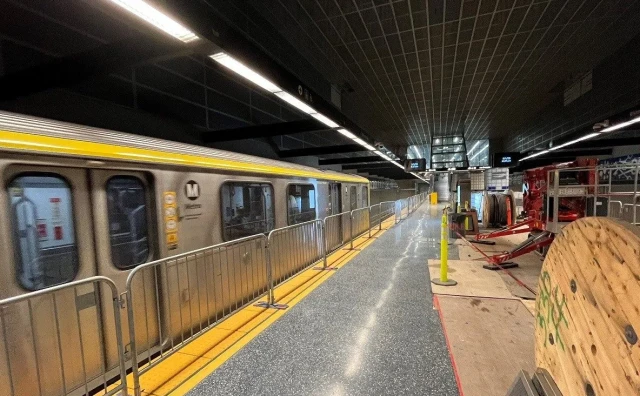With our free press under threat and federal funding for public media gone, your support matters more than ever. Help keep the LAist newsroom strong, become a monthly member or increase your support today during our fall member drive.
Yeonpyeong Residents Assess Damage, Future

As officials in Pyongyang warned of more attacks -- two days ago a North Korean attack killed four people on the South Korean island of Yeonpyeong -- residents trickled back to the war-torn island to collect their belongings.
Returning home, however, is not a decision taken lightly.
Onboard a ferry, Kim Hae-jeong cradles her 4-month-old daughter, bracing herself. The whole family is going back for a few hours, against Kim's better judgment, to collect essentials for the baby.
"I was reluctant to go to the island today, but no one could take care of my baby," Kim said. "Rather than my husband going alone, I'd rather we all went together. If we're going to die, I'd rather we died together."
Kim and her family arrive on the island and walk out along the pier, which is full of soldiers wearing bulletproof vests. Security is extremely tight. The family truck is waiting at the pier, and they drive toward their home.
Yeonpyeong was once a sleepy fishing village, albeit in a frontline position -- now it's become a war zone. Some houses are intact, while others have had their roofs blasted off and have been gutted by fire. There's broken glass underfoot and, above all, an atmosphere of pure, undiluted fear.
Trucks loaded with possessions zoom past, and the only topic of conversation is what time the last ferry of the day is leaving. Most of the village's 1,200 residents seem to have decided en masse to flee.
As a chopper flies overhead, village doctor Park Seung-chol says everyone is suffering.
"People are traumatized here," Park said. "Even us, health care professionals, we have that kind of anxiety. When we hear a little sound, we jump. And everybody on the island is the same."
Park is a reluctant holdout. He'd like to leave, but leaving isn't an option. He's chosen to work here as an alternative to military service, so he has to stay on. Park is working to set up a new medical center after the original one was damaged. It's one of the public buildings that villagers believe was targeted by the North Koreans, along with the marine base.
"The villagers were in chaos, because shells were dropping all the time," said Park, describing how it felt to be under attack. "People talk about a first wave and a second wave of attacks, but I felt like there was constant bombing. And people were coming to see me to get treatment for injuries caused from flying debris."
As the ferry sets off back to the mainland, it's packed full of refugees. They slump on their seats, exhausted from terror and uncertainty. Although their island home is just eight miles from North Korea, few imagined this day would come.
Shin Sun-ja has lived in the village for six decades. At 67, she's finding it hard to come to terms with what she's lost.
"I'm a farmer and I planted 700 cabbages this year, so I'd like to go back," she said. "But my house is next to the marine base, and it was destroyed. Everything is gone. My car is damaged. I only have the clothes I'm wearing."
Despite watching the wall-to-wall news coverage of their plight, few of the victims of the attack are angry. Instead, there's shell-shocked incomprehension.
One villager summed up the problem, saying, "The North Koreans are our brothers -- and our enemies." That's a contradiction most South Koreans have yet to square.
Copyright 2022 NPR. To see more, visit https://www.npr.org. 9(MDA1OTI3MjQ5MDEyODUwMTE2MzM1YzNmZA004))
At LAist, we believe in journalism without censorship and the right of a free press to speak truth to those in power. Our hard-hitting watchdog reporting on local government, climate, and the ongoing housing and homelessness crisis is trustworthy, independent and freely accessible to everyone thanks to the support of readers like you.
But the game has changed: Congress voted to eliminate funding for public media across the country. Here at LAist that means a loss of $1.7 million in our budget every year. We want to assure you that despite growing threats to free press and free speech, LAist will remain a voice you know and trust. Speaking frankly, the amount of reader support we receive will help determine how strong of a newsroom we are going forward to cover the important news in our community.
We’re asking you to stand up for independent reporting that will not be silenced. With more individuals like you supporting this public service, we can continue to provide essential coverage for Southern Californians that you can’t find anywhere else. Become a monthly member today to help sustain this mission.
Thank you for your generous support and belief in the value of independent news.

-
Kevin Lacy has an obsession with documenting California’s forgotten and decaying places.
-
Restaurants share resources in the food hall in West Adams as Los Angeles reckons with increasing restaurant closures.
-
It will be the second national day of protest against President Donald Trump.
-
The university says the compact, as the Trump administration called it, could undermine free inquiry and academic excellence.
-
This is the one time you can do this legally!
-
Metro officials said it will be able to announce an opening date “soon.”







